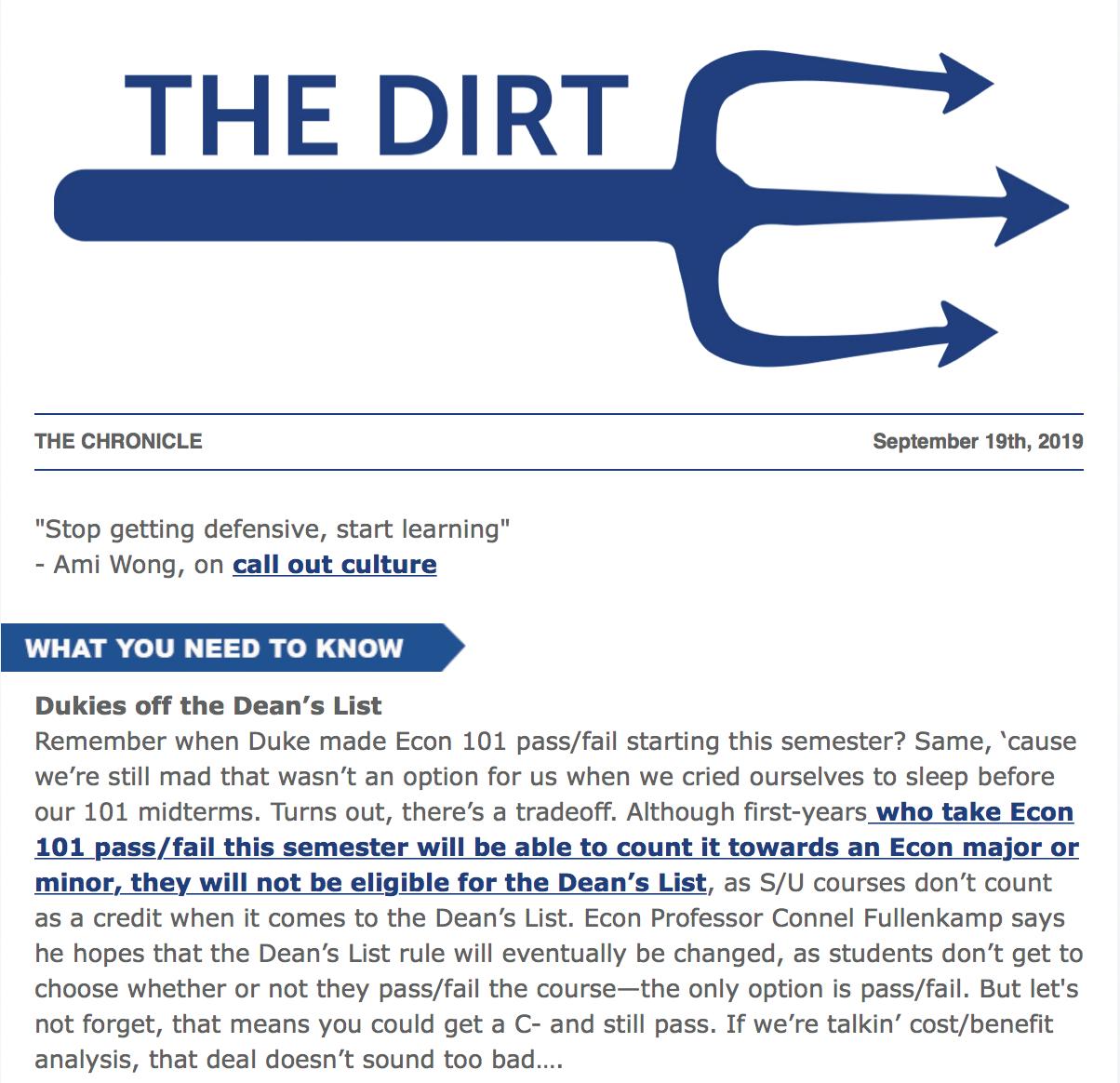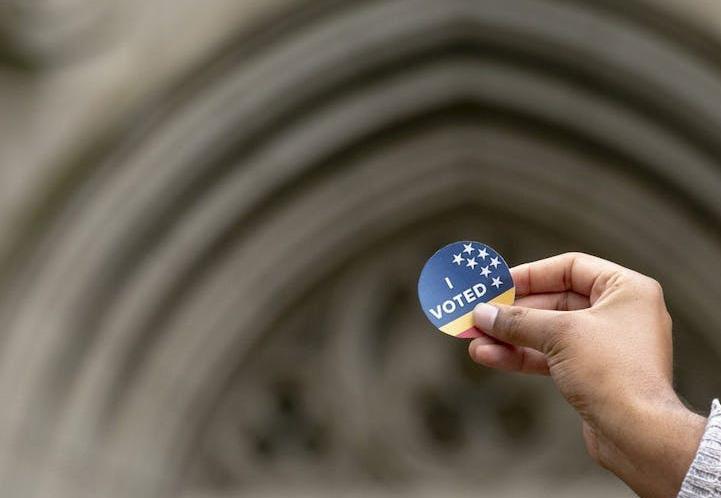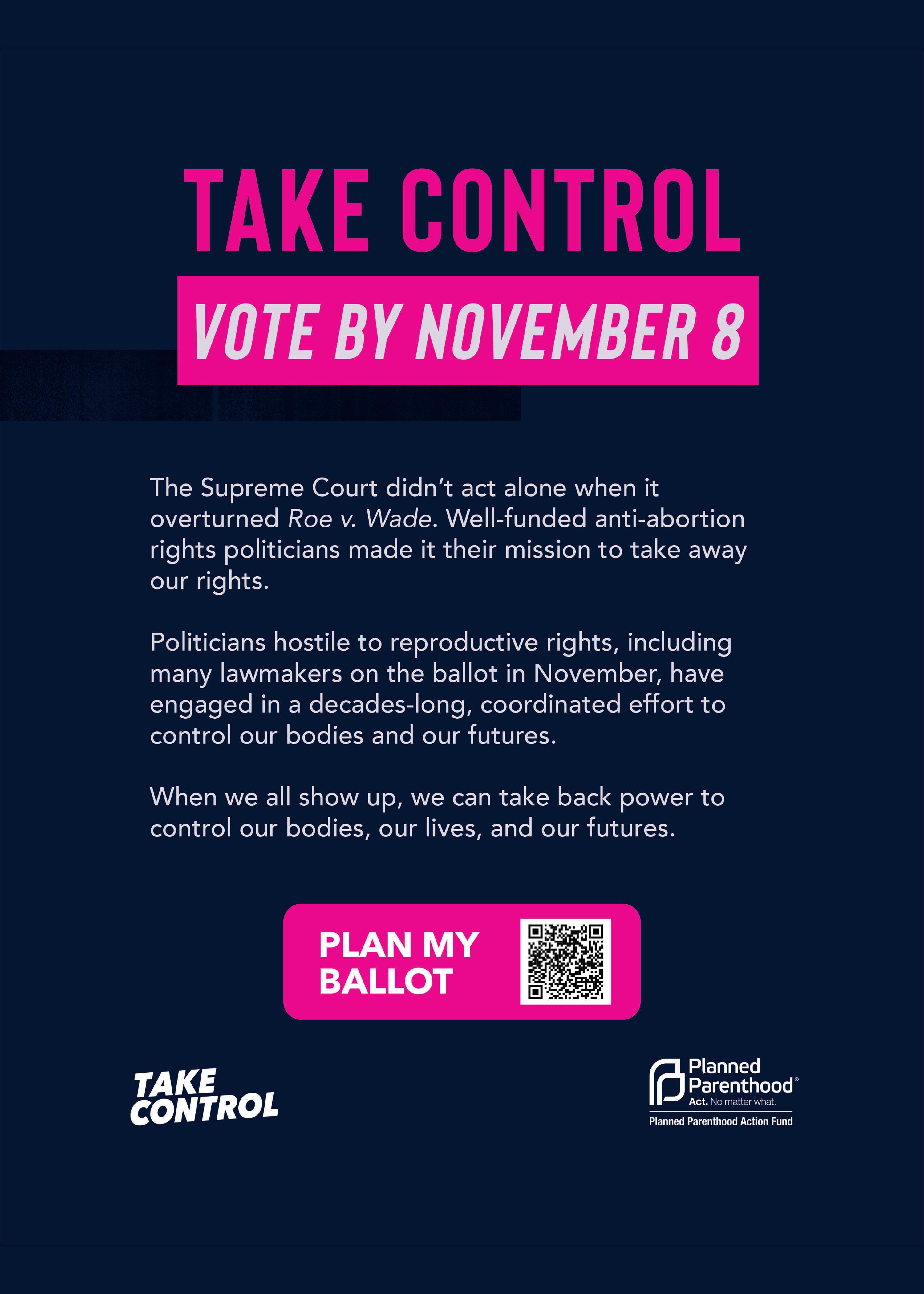ELECTIONS 2022





An election that could define the balance of power in the NC General Assembly and Supreme Court, as well as the future of abortion access, might not be “radically different” than other years, a professor says.
By Kathryn Thomas News EditorThe U.S. Senate race in North Carolina between Cheri Beasly and Congressman Ted Budd might be garnering lots of attention, but the 2022 midterm elections will determine the balance of power in the North Carolina General Assembly and Supreme Court. They may also decide the future of abortion access in North Carolina.
Despite an initial wave of advocacy from Democrats after the Supreme Court’s Dobbs v. Jackson decision in June, which reversed nearly 50 years of precedent protecting the right to an abortion, election experts expect 2022 to be a good year for the Republican party.
Mac McCorkle, Law School ’84 and professor of the practice in the Sanford School of Public Policy, described the midterm elections as traditionally a “bad time for that incumbent party” in the U.S. Congress. The results of the election usually compensate for the President’s party “overwinning” in the previous cycle.
However, because current control of the U.S. Congress is so close, with 212 Republicans and 220 Democrats, “you might not see as big a sweep, as you usually do against the incumbent party,” McCorkle said.
Christopher Cooper, Robert Lee Madison distinguished professor of political science and public affairs at Western Carolina
University, seconded McCorkle’s analysis.
“It’s not going to be a blue wave. Is it going to be a red wave? Is it going to be a red ripple? Is it going to be something in between?” he said.
As of Oct. 6, mail-in absentee voting ballot requests are already double the requests from 2018.
But according to Cooper, nothing suggests the 2022 midterm election will be a “radically different kind of election in North Carolina.”
“I think it does illustrate that American politics despite the outsized personalities, despite the scandal, despite the polarization is actually remarkably stable and predictable,” he said.
After the Dobbs decision, female voting turnout was expected to rise substantially. However, early voting data does not suggest this.
While there are still a lot of votes to count, “if we were going to see a big effect, I would have thought we’d see some glimpse of it now,” Cooper said.
North Carolina General Assembly State Republicans lost their supermajority in 2018, but they only need to pick up two seats in the Senate and three seats in the House of Representatives this Election Day to have a three-fifths majority in each chamber — enough to override
Democratic Gov. Roy Cooper’s veto.
The supermajority makes the critical difference between the “state government passing very little, and the Republicans being able to pass essentially whatever they want,” Professor Cooper said.
As of July 2022, Gov. Cooper has issued 75 vetoes during his first six years in office and he has issued more vetoes than any other governor in North Carolina history.
In Gov. Cooper’s first two years in office, he vetoed 28 bills, but 23 were overridden by the GOP supermajority. In 2018, Democrats regained enough seats to sustain every veto from the governor since then.
If Republicans win three-fifths of the seats, party leaders have declared they intend to pass more restrictions on abortions and reconsider some of the bills Cooper already vetoed.
“North Carolina is a safe haven for abortion rights access,” McCorkle said, but that could change if Republicans gain a three-fifths majority.
While many of the races across the state are considered safe for either party, there are a few races experts say people should pay attention to on election night. There are two senate races that McCorkle considers indicators of the overall results.
“If you see Mary Wills Bode winning in
See AT STAKE on Page 10
Several Duke alumni are running in local and national races, including for U.S. Senate and House of Reps.
By Jazper Lu Local National News EditorYou can expect to see several Duke alumni and previous employees on your ballot.
Some are candidates in national races, while others are running for local positions. Several graduated from the Law School and Trinity College of Arts and Sciences, and some obtained degrees from Duke’s Fuqua School of Business and Duke School of Medicine.
Cheri Beasley, Law School ‘18, is running in one of the most contentious elections across the country to represent North Carolina as the Democratic nominee in the U.S. Senate.
After earning her juris doctor from the University of Tennessee College of Law, Beasley received a Master of Laws from Duke Law. From 2019 to 2020, Beasley served as the chief justice on the North Carolina Supreme Court. In the 2020 election, Beasley lost her re-election bid by just 401 votes to Republican Paul Newby, Trinity ‘77. Before her appointment as chief justice, Beasley was an associate justice on the Court from 2012-2019.
Republican Sen. Rand Paul, School of Medicine ‘88, has represented Kentucky in the U.S Senate since 2011. He unsuccessfully ran for the Republican nomination for president in 2016. His father, Ron Paul, School of Medicine ‘61, was a 12-term U.S. representative from Texas and a threetime presidential candidate. Rand Paul was originally critical of former President Donald Trump in 2016 but later became one of his key allies in the Senate.
Democratic Rep. Mike Levin, Law School ‘05, is running to secure a third term in the U.S. House to represent California’s 49th Congressional District. He is assigned to the House Committee on Veterans’ Affairs and Committee on Natural Resources and
has experience working as an attorney for environmental and energy issues.
Democratic Rep. Scott Peters, Trinity ‘80, is running for re-election to represent California’s 52nd Congressional District, a position he has held since 2013. Currently, Peters sits on the Joint Economic Committee, the House Committee on Budget and the House Committee on Energy and Commerce.
Jay Robert “J. B.” Pritzker, Trinity ‘87, is a Democrat and running to be re-elected as governor of Illinois after having served since 2019. As a member of the wealthy Pritzker family, which owns the Hyatt hotel chain, Pritzker has an estimated net worth of $3.6 billion. Pritzker has also been a member of the Duke University Board of Trustees since 2017.
Blue Devils are also running to represent the Duke community in the N.C. General Assembly.
Sen. Mike Woodard, a Democrat, has represented District 22 in the North Carolina State Senate since 2013 and is running for another term. Woodard used to work for Duke and Duke Health as a financial administrator, and served on the Durham City Council from 2005-2012. District 22 only included East Campus in previous elections, but because of the 2020 redistricting cycle, Woodard will represent Duke’s entire campus if he wins.
Ray Ubinger, Trinity ’87, is also running to represent Senate District
Early voting at Duke’s KarshAlumni Center ends Nov. 5.
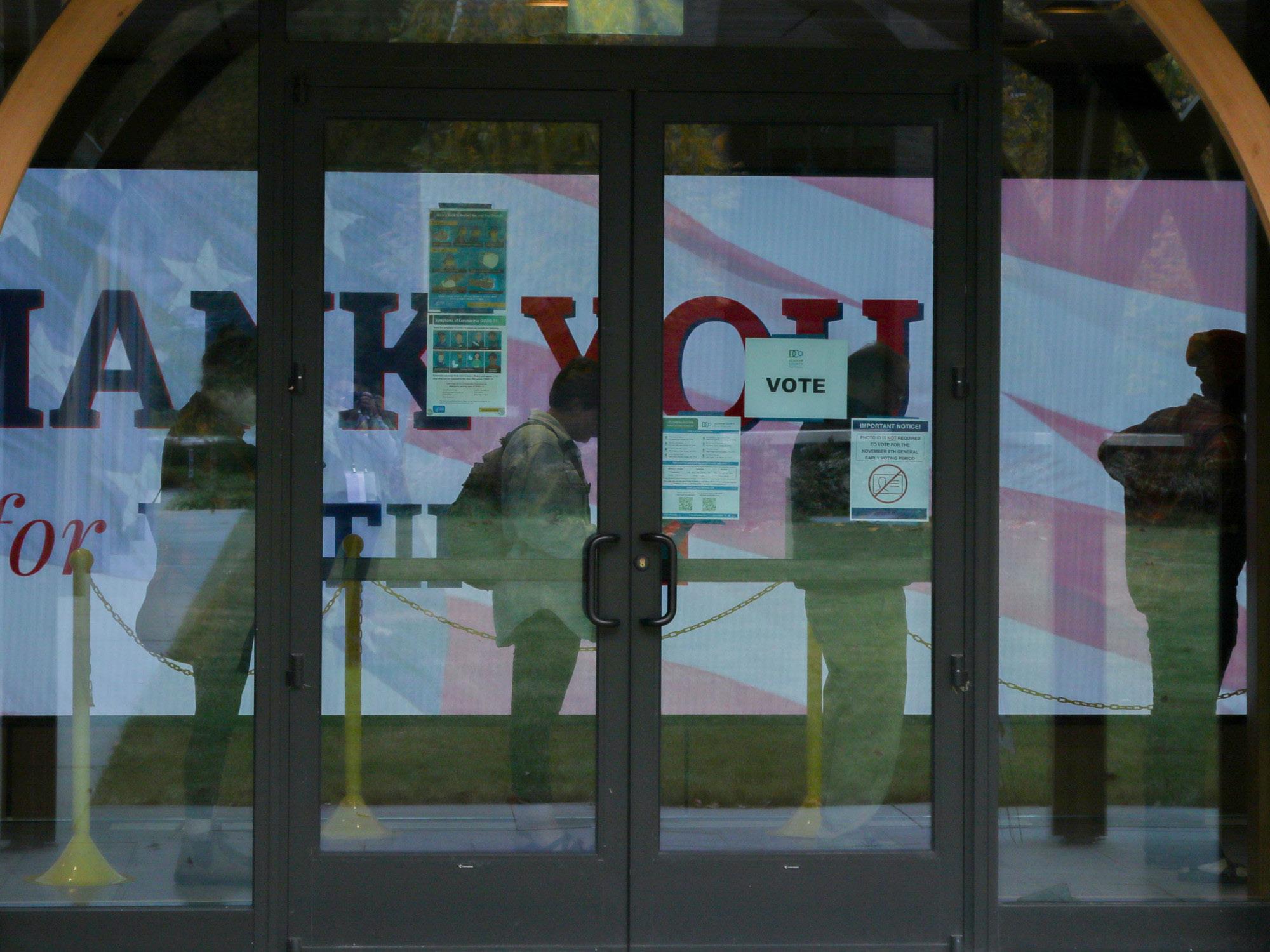 By Ethan Niang Senior Reporter
By Ethan Niang Senior Reporter
Now that North Carolina’s voter registration deadline has passed, voters will take to the polls on Nov. 8 for the state’s midterm elections. Same-day registration during early voting will be available for those who missed the Oct. 14 deadline.
Early voting: Oct. 20-Nov. 5
The early voting period will begin on Thursday, Oct. 20 and end at 3 p.m. on Saturday, Nov. 5. Early voting is convenient for people who are unable to vote on Election Day or at their assigned polling place.
Voters who are registered in Durham County will be able to cast their ballots at any early voting site across the county. There are eight early voting sites in Durham County.
Duke’s on-campus early voting site is located at the Karsh Alumni Center. The address is 2080 Duke University Road and students can access Karsh on the C1 bus route.
On weekdays, early voting will take place from 8 a.m. to 7:30 p.m. On Saturdays, early voting is open 8 a.m. to 3 p.m. and on Sundays early voting is open from 2 to 6 p.m.
The county has a live early voting site locator that will show wait times when early voting begins.
Those who did not register by the Oct. 14 deadline may utilize same-day registration and vote at early voting sites.
In addition to completing an application, a voter must show an identifying document providing proof of residency, such as an NC driver’s license, a utility bill or a photo ID from a government agency.
College students need to bring their university ID paired with “any document originating with the educational institution and containing the student’s name and oncampus housing address or facility name,” according to the North Carolina State Board of Elections.
Voters can check the details of their registration using the state’s Registration Lookup Tool and find early voting sites in additional counties on the NC Board of Elections Website.
On Election Day, registered voters must vote at their assigned polling site. Voters can find their Election Day polling place by searching their address into the Polling Place Search.
Students registered at the 1 Duke University West Campus residential address will vote at W.I. Patterson Recreation Center. Students registered at the 1 Duke University East Campus residential address will vote at the George Watts Elementary School.
According to the North Carolina State Board of Elections, polling places will be open from 6:30 a.m. to 7:30 p.m on Election Day. Voters in line at their assigned polling place by 7:30 p.m. are allowed to cast their vote.
Voters do not have to bring a photo ID in order to vote. If questions arise about a voter’s eligibility to vote, they should be allowed to cast a provisional ballot, according to the North Carolina Board of Elections.
Registered North Carolina voters may also request and vote via a mail-in absentee ballot without providing special reasons or proof of special circumstances.
Mail-in ballots can be requested with official NC Absentee Ballot request forms found either online at the NC Absentee Ballot Portal or an application can be submitted on paper.
notion of one person, one vote,” she said.
By Jazper Lu Local National News EditorValerie Foushee is the Democratic nominee for the U.S. House of Representatives from North Carolina’s 4th Congressional District which includes Durham County, Orange County, Person County, Granville County, Alamance County and parts of Caswell County.
Foushee is currently a state senator in North Carolina for District 23, a position she has held since 2013 after a brief stint in the North Carolina House of Representatives.
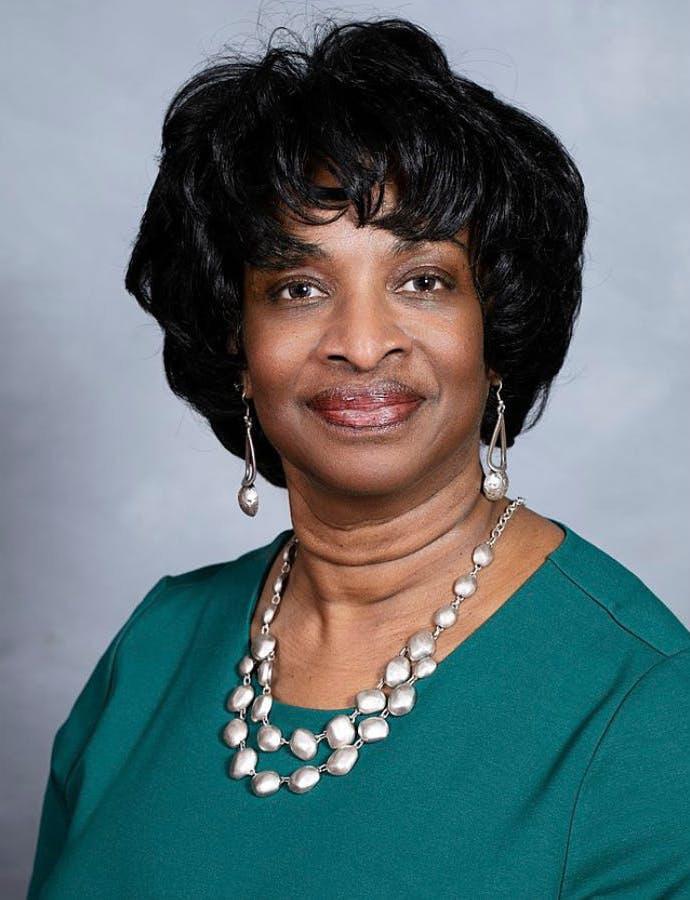
Before that, she worked as an administrator with the Chapel Hill Police Department, served as the first AfricanAmerican female elected to the Orange County Board of Commissioners, was on the Chapel Hill-Carrboro City School Board and also held various administrative positions with insurance and research companies.
Foushee holds a bachelor’s degree in political science and African and AfroAmerican studies from the University of North Carolina at Chapel Hill.
Why she’s running
Foushee thought that she would end her tenure in elected service in the North Carolina State Senate. However, after U.S. Rep. David Price, a Democrat, announced his retirement, Foushee saw a window of opportunity.
“I started receiving phone calls from supporters asking me if I would consider a run. I had not considered running,” she said. “I did see an opportunity to advance some ideas that, of course, we’ve not been able to move in the General Assembly.”
Codifying Roe v. Wade
Foushee is pro-choice and believes it is time for the core holding of Roe v. Wade, which conferred the right to have an abortion, to be codified into federal law.
“I think if there is one thing that any human being is in control of, it’s his or her own body,” Foushee said. “That shouldn’t be different for women as it is for men, women should have the right to determine if they want to bear children. And if they don’t, women should have the right to reproductive healthcare.”
Foushee would consider term limits for the justices on the Supreme Court if the Court were to strike down legislation to codify Roe into federal law, but would be open to other ways to strengthen checks and balances.
Foushee is concerned about the rising costs of healthcare and supports a Medicare for All system. However, she stopped short of putting her support behind phasing out private insurance.
“I don’t think we should phase out private insurance altogether. I think we should offer a public option [so] that means there’s
something else available,” Foushee said.
Foushee intends to support the passage of the For the People Act and the John Lewis Voting Rights Act if elected to Congress. She also wants to work towards eliminating gerrymandering.
She believes a nonpartisan commission should draw the congressional districts.
“We need to rid ourselves of gerrymandering so that we can protect the
Foushee also believes that allegations of widespread voter fraud during the 2020 election are unsubstantiated. However, she thinks that there is still more to be done to strengthen voter protection to ensure that every vote counts. In the North Carolina Senate, she has sponsored legislation to automatically register eligible voters and make Election Day a public holiday in the state.
Foushee believes “common sense” gun laws are necessary. These laws include proposals like raising buyers’ minimum age and strengthening background checks, while preserving individuals’ Second Amendment right to bear arms.
“Why would we not want to do background checks to ensure that people who are purchasing weapons have not had incidents of where they have committed violent acts?” Foushee said.
Foushee believes that the government should start providing free higher education. Specifically, she supports providing free community college for students and eventually moving towards providing other free higher education options at public institutions.
The state senator also approves of President Joe Biden’s move to cancel up to $20,000 in student loan debt, but questions the government’s ability to cancel all student loan debt.
By Jazper Lu Local National News EditorCourtney Geels is the Republican Party’s nominee for U.S. House of Representatives in North Carolina’s 4th Congressional District, which includes Durham County, Orange County, Person County, Granville County, Alamance County and parts of Caswell County.
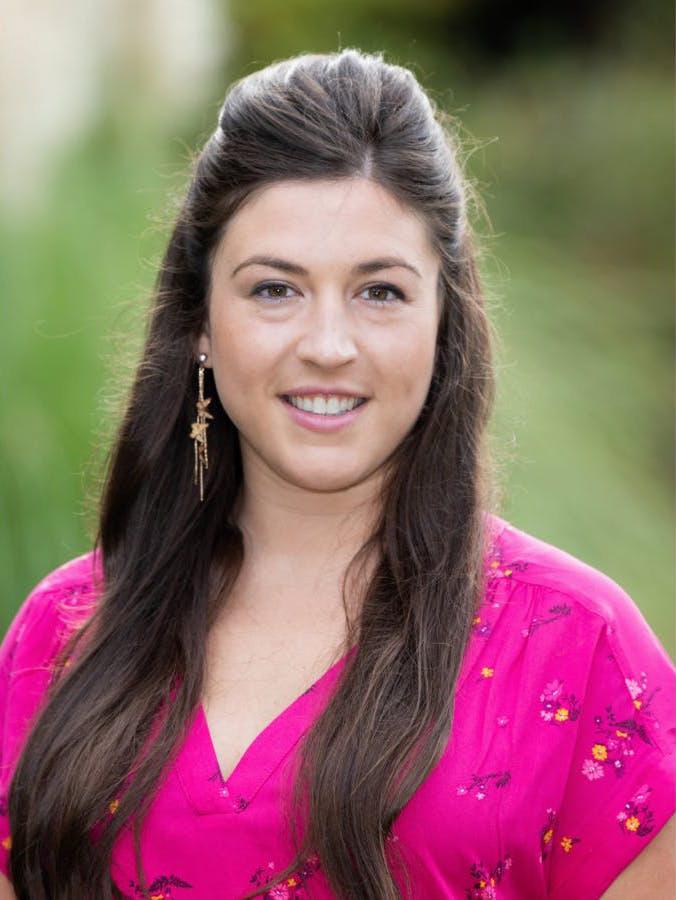
Geels is a nurse with ten years of experience in emergency and trauma medicine. She holds a Bachelor of Science in Nursing from Bob Jones University, and this is her first time running for elected office.
Why she’s running
Geels was inspired to run for Congress after she and her husband, a certified public accountant, noticed similar top-down structures in their workplaces and within the American political system.
“We’re noticing a very similar trend, where you have really high-level executives making decisions that are so far removed from what their product is. For me, it was quality patient care and the bedside physical care of a patient, and for my husband, it was a financial audit,” Geels said. “It’s a very similar pattern I’m seeing in our federal government.”
Geels hopes to move power away from the federal government and towards state governments, and more generally to decentralize power. One of her key priorities would be to eliminate the use of executive orders by the president, either through federal legislation or by constitutional amendment.
“I don’t care if Trump’s president, I don’t care if Biden’s president, not one person should be able to make and enforce law,” Geels said.
Geels would also like to delegate more responsibility for education to the states. As an example of federal overreach, she cited the U.S. Department of Agriculture’s decision to withhold school lunch funding from schools that did not have specific policies prohibiting discrimination on the basis of gender identity and sexual orientation.
Geels takes a strong “pro-life” stance on abortion. However, due to her desire to decentralize power, Geels does not plan to introduce legislation related to abortion on the federal level, hoping to leave that decision up to the states. Nevertheless, Geels said that she would still vote for a federal abortion ban if such a bill was proposed.
Geels also emphasized that such a bill would have to make exceptions to protect the life of a mother, stressing the dangers of an ectopic pregnancy, a situation in which the fertilized egg is not implanted in the uterus and is thus non-viable. As for other exceptions, she would not personally support any for rape and incest.
“I have told people that my personal beliefs don’t include [exceptions for rape and incest],” said Geels. “But I would be happy to sign a bill that has [those exceptions] in there.”
Geels hopes to use her nursing experience to bring a patient-level perspective to healthcare reforms in Congress. She hopes to investigate and tweak the qualification structure for Medicaid, arguing that some lowincome people make just above the threshold to qualify for Medicaid, incentivizing people to not work or work less.
A lack of transparency is the biggest problem facing U.S. healthcare, according to Geels. She supports the federal government mandating hospitals to publicly post their prices if they are receiving any sort of federal funds for healthcare.
Geels believes that elections are the role of the states and not the federal government. Thus, she would not plan to engage legislatively on elections. Geels does believe that substantial voter fraud occurred in the 2020 election in Georgia, though she affirms the ultimate outcome of the election.
She also stressed that she did not support the Capital riots on Jan. 6, calling them “illegal” and “horrific.”
Geels believes that legislation that restricts the sale of semi-automatic weapons or permitless carry infringes on Second Amendment rights.
“The whole point is, again, to prevent tyrannical government, which my whole goal is to decrease the power of the federal level,” Geels said. “I’ve asked
a ton of international people and said, ‘What do you like about America? What do you see significantly different about America and our government?’ [They] say you have guns, and they say it in a positive way.”
Geels, however, says that she is open to background checks or restrictions of a similar manner. She also argues that the federal government should spend money to bolster mental health care, specifically acute, chronic and preventative care, in order to bring down levels of gun violence.
Geels does not support canceling student loan debt for higher education.
“Debt is [when] you’ve purchased a product. So, whether it’s your education or your TV, you’ve purchased a product. You knew going in, that was the tuition,” said Geels.
After nearly 10 years as state senator, Democratic candidate Valerie Foushee is running for U.S. House
Republican Courtney Geels is running for U.S. House with a focus on decentralizing federal power
Democratic candidate Cheri Beasley is challenging Republican Congressman Ted Budd to replace Sen. Richard Burr (R-NC), who is retiring.
Beasley most recently served as the chief justice of the North Carolina Supreme Court, a position she was appointed to by Gov. Roy Cooper in 2019. She was the first Black woman to serve this post. Beasley was previously an associate justice of the State Supreme Court, being elected to an eight-year term in 2014 after Gov. Beverly Perdue appointed her to fill a vacancy in 2012.
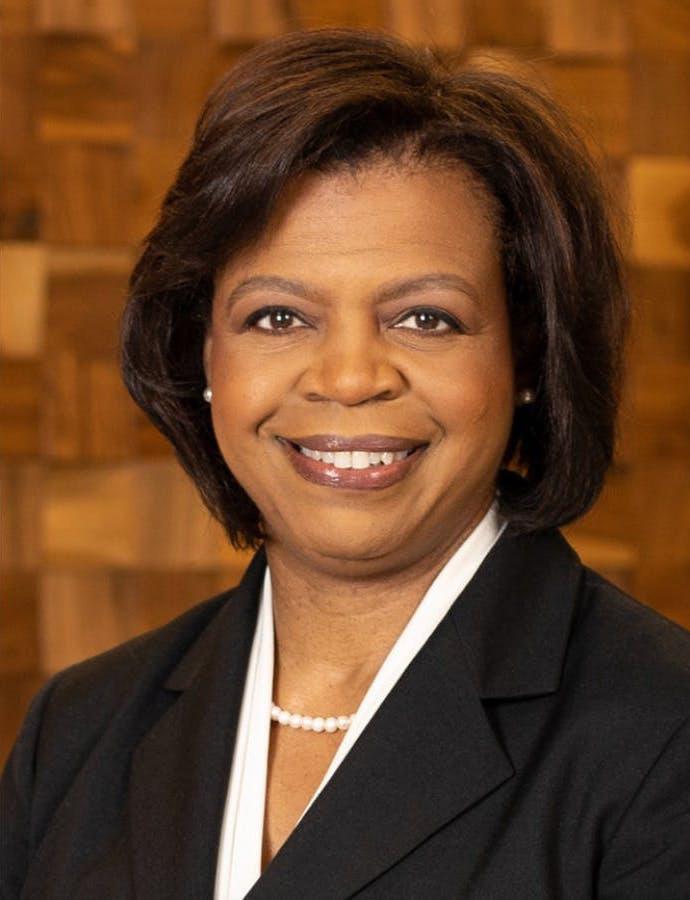
Beasley received her Juris Doctor from the University of Tennessee College of Law in 1991, and she earned a Masters of Laws degree at Duke University School of Law in 2018.
In addition to her experience on the State Supreme Court, she was elected to the North Carolina Court of Appeals in 2008 and was a judge in North Carolina’s 12th judicial district from 1999 to 2008.
In 2020, she narrowly lost an election to remain chief justice by just 401 votes. After a brief stint with the McGuireWoods law firm, she announced her candidacy for U.S. Senate in April 2021.
Some of Beasley’s main policy stances surround her experience in the court, running on a platform of “the pursuit of justice and fairness,” according to her campaign website.
Beasley wants to focus on reforming court sentencing with the expansion of drug treatment and mental health courts. She also supports legalizing marijuana and the George Floyd Policing Act, which attempts to combat police misconduct and excessive force, as well as introduce racial bias training.
Healthcare and reproductive rights are one of the biggest issues on the ballot in
November. As far as healthcare, Beasley supports expanding Medicaid and the Affordable Care Act with a public option, hoping to focus on rural areas.
On abortion, Beasley wants to repeal the Hyde Amendment, which bans the use of federal Medicaid to fund most abortions, and codify Roe v. Wade under the Women’s Health Protection Act. She is endorsed by the Planned Parenthood Action Fund.
The economy and inflation will also be a pressing issue this election cycle. In her debate against Budd, Beasley did not directly answer whether she would have voted for President Biden’s latest stimulus packages. She instead focused on the need to lower prices, particularly prescription drug costs. Beasley believes that making the expanded child tax credit permanent and passing a federal medical and family leave law will alleviate the financial pressure for many North Carolinians. She also supports raising the federal minimum wage to $15/hour.
In the only scheduled debate of the campaign, the two candidates for U.S. Senate discussed their competing visions for the state.
By Sevana Wenn Features Managing EditorDemocrat Cheri Beasley and Republican Ted Budd, candidates for U.S. Senate, faced off Oct. 7 in the first and only scheduled debate of the campaign season. Beasley and Budd discussed their competing visions for North Carolina, exchanging takes on critical issues such as inflation, abortion rights and immigration.
The candidates, who are running to replace Republican Sen. Richard Burr, are now in the home stretch of a tightly contested race. The outcome of the Nov. 8 election could tip the balance of power in the Senate, a fact that loomed large as Budd and Beasley sparred over contentious topics.
Here are some highlights from the debate.
Moderator and journalist Tim Boyum kicked off the evening by asking candidates about one of the nation’s most pressing issues: the economy. The candidates held different
beliefs of the root causes of inflation.
Budd laid blame for inflation at the feet of the Biden administration, whose COVID relief packages he said went “way too far” and promoted unnecessary spending. Budd proposed cutting regulations, which he says hurt small businesses, and approving more energy projects.
Beasley also criticized the White House’s response and took an opportunity for a quick jab at Budd.
“We know that corporations are seeing 70year record profits and using that as a cover for inflation and jacking up prices, and Congress can stop that,” Beasley said. “But Congressman Ted Budd hasn’t stopped that, and, in fact, he’s actually helping it. He’s voted against lowering drug prices and gas prices.”
Abortion access is set to be a key issue in
Congressman Ted Budd, a Republican, aims to defeat Democratic challenger, Cheri Beasley, and fill Sen. Richard Burr’s (R-NC) soon to be vacant seat in the U.S Senate.
Budd was born in Winston-Salem in 1971 and was raised in a working-class family. He attended Summit School in Winston-Salem, and later attended Davie County High School, graduating in 1990. Budd studied business at Appalachian State University, graduating in 1994, and went on to receive a master’s in business administration from the Wake Forest University School of Business in 2007.
Most recently, Budd has been serving as the U.S. Representative for District 13, assuming office in 2017 after a contentious battle against 17 candidates. He currently resides on the Committee for Financial Services (serving on the Subcommittee on Consumer Protection and Financial Institutions and Subcommittee on Diversity and Inclusion) and is a member of the Freedom Caucus.
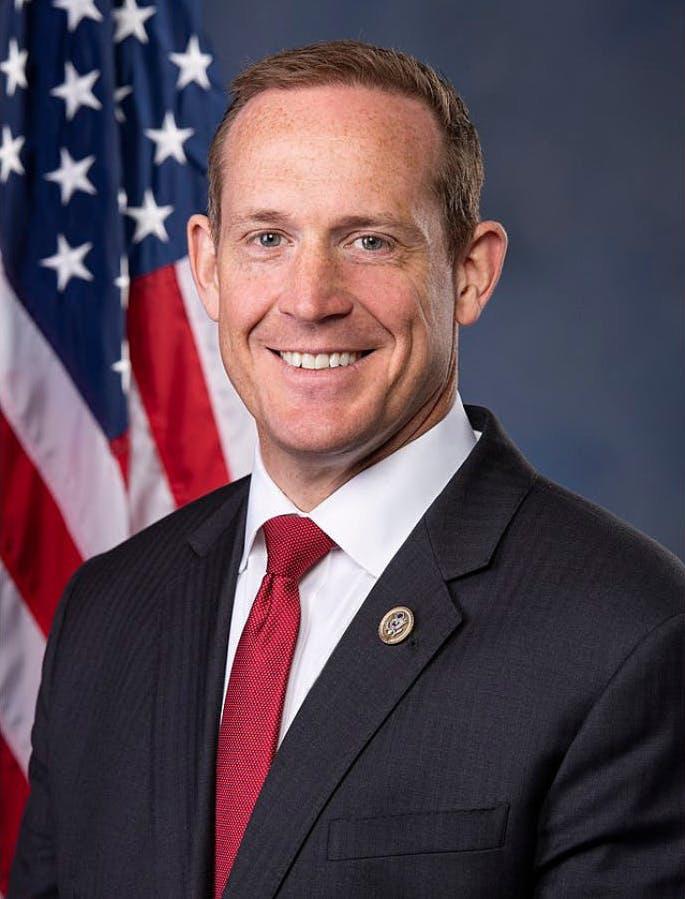
Budd’s campaign website refers to President Joe Biden’s “incompetence” as a primary motivator for running. Budd is endorsed by former President Donald Trump.
Budd has focused on the results of the 2020 presidential elections. Budd was one of 126 House of Representatives Republicans that contested the results of the presidential election by supporting the filing of Texas v. Pennsylvania. This lawsuit, filed by Texas Attorney General Ken Paxton, asked the U.S. Supreme Court to review election results in Wisconsin, Georgia, Michigan and Pennsylvania, where Biden emerged victorious over Trump.
Furthermore, Budd was also one of 139 House Republicans that objected to the formal certification of the 2020 presidential election results on January 6, 2021. Budd has advertised the need to “safeguard elections” by enacting more voter ID requirements.
When asked at an October debate with Beasley whether he believed that the results of the 2022 election would be legitimate, he said he did. He also acknowledged the legitimacy of Biden’s electoral victory in 2020, but stood by his prior vote not to
ON DUKECHRONICLE.COMcertify the results of the election.
Budd is pro-life and has previously said in the debate that he has “always been about protecting the life of the mother. I want to save as many unborn lives as possible.”
In September, Budd co-signed House Resolution 8814, which would instate a national ban on the procedure after 15 weeks. During the debate, however, he did not specify how far he believes restrictions should go in cases of rape, incest or danger to the life of the mother. Despite his support for the H.R. 8814, he said in regards to the Dobbs ruling that the issue of abortion access should be left to the states.
Budd supports anti-trust legislation and is a staunch advocate of protecting Second Amendment gun rights as a small-business owner of a gun store. Budd also believes in funding and expanding law enforcement. His platform includes ensuring new jobs are created rather than the “socialist” policies of Build Back Better and the Green New Deal, according to his website.
In the debate against Beasley, Budd laid blame for inflation at the feet of the Biden administration, whose COVID relief packages he said went “way too far” and promoted unnecessary spending. Budd proposed cutting regulations, which he says hurt small businesses, and approving more energy projects.
Libertarian Party nominee Shannon Bray running for U.S. Senate to spotlight government corruption
BY JAZPER LU | 10/23/2022
Bray doesn’t necessarily want to be elected, but wants to use his candidacy to spotlight government corruption
Green Party candidate Matthew Hoh running for U.S. Senate to ‘disrupt the current political system’
BY JAZPER LU | 10/23/2022Hoh is running because of what he sees as the “lack of accountability” from the government and Democrats.
BY JAZPER LU | 10/30/2022VIDEO: Meet Valerie Foushee and Courtney Geels, Democratic and Republican nominees for NC’s 4th Congressional District
In the upcoming midterm elections, a Senate seat in District 22 of the North Carolina General Assembly is on the line.
There are three candidates on the ballot: and incumbent Democrat Mike Woodard, Republican Larry Coleman and Libertarian Ray Ubinger.
Republicans hold a majority of the seats in the General Assembly. Elections this November will determine if this majority endures and if Republicans can recover the supermajority that the party lost in 2018. Republicans would need a net gain of two seats in the North Carolina Senate and three seats in the North Carolina House of Representatives to gain a supermajority.
In the event of a Republican supermajority, Democratic Gov. Roy Cooper’s vetoes of Republican legislation throughout his time in office could be overruled. A possible outcome would be that the legality of abortion within the state could be changed.
The District 22 seat is currently held by Democrat Mike Woodard, Trinity ’81. In office since 2013, Woodward’s policy platform since joining the North Carolina Senate has been focused on effective
education, accessible and affordable healthcare and fostering a strong economy in North Carolina.
Woodard currently serves on the Appropriations/ Base Budget, Appropriations on Department of Transportations, Finance, Health Care, the Rules and Operations of the Senate and the Transportation Committees.
Prior to his career in the North Carolina Senate, Woodard worked as an administrator at Duke.
Running against Woodard is Republican Larry Coleman.
Coleman is new to the realm of political campaigning but not a stranger to District 22. He has lived in the district for over 20 years and has been an active community member. After serving in the military, he became heavily involved in the Durham Public School System and Durham’s Department of Parks and Recreation.
“Giving back to the community, and being involved with the community just made me realize this is the kind of stuff I enjoy doing,” Coleman said. “And I think I have the capabilities and talents to provide that [at the] elected level.”
Coleman has piloted a new branch of the Durham Parent Teacher Association for parents of special needs children. His current community project is the development of Veterans of Foreign Wars properties dedicated to affordable
A supermajority is a threefifths majority in the House and Senate. The Republican Party only needs to gain two seats in the Senate and three seats in the House to be able to override Democratic Gov. Cooper’s veto.
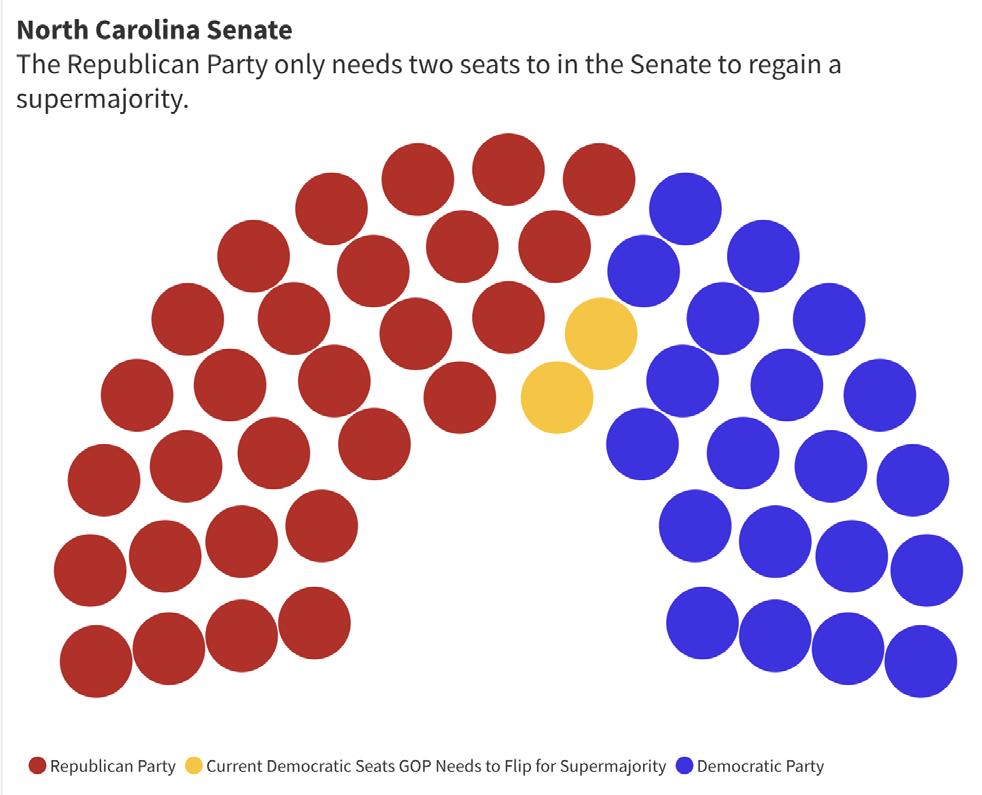 VISUALIZATIONS BY KATHRYN THOMAS
VISUALIZATIONS BY KATHRYN THOMAS
housing and a community co-op.
Along with veteran advocacy, one of Coleman’s main goals is to develop more affordable housing solutions in North Carolina.
“We’re looking for opportunities from the state level to help that situation currently, not just in Durham, but across the state,” Coleman said.
Coleman currently works as a full-time CFO and is vice president of administration at Piedmont Community College.
Another of Coleman’s main political priorities if elected is ensuring public schools receive more funding.
“I do believe our teachers do deserve to be paid more,” Coleman said.
Coleman also seeks to improve upon North Carolina’s criminal law code.
“I think we can do some things to streamline some of our legal code code and make it not as confusing, which allows law enforcement to focus on the laws they need to focus on,” he said.
The Chronicle emailed Ubinger requesting an interview. Ubinger responded, “I am not asking anyone to vote for me. I don’t campaign, accept donations, or do questionnaires/forums/interviews/pledges. I don’t even tell anyone I’m on the ballot. I am, as my committee name puts it, Just Buying Permission to Vote for Myself.”
By Zoe Spicer Contributing ReporterElections for the North Carolina General Assembly are coming up with three candidates running to represent District 30 of the North Carolina House of Representatives: Rep. Marcia Morey, a Democrat, Republican William Antico and Libertarian Guy Meilleur.
The midterm elections in North Carolina can shift the balance of the state’s House of Representatives.
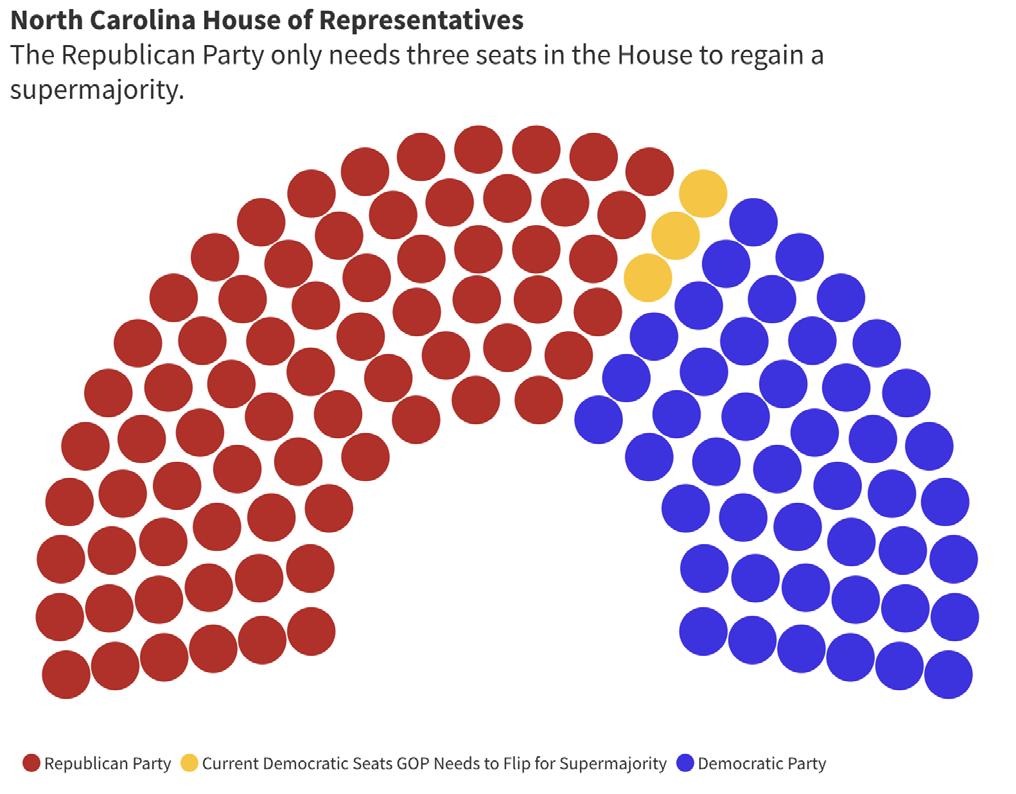
If the Democrats lose three seats in the North Carolina House, the Republicans will have a supermajority, at which point the Republican party can override Democratic Gov. Roy Cooper’s vetoes.
Veto power is especially important for Democrats in the House as Speaker Tim Moore, a Republican, has stated that he personally supports legislation banning abortion when an ultrasound detects a heartbeat.
The fate of Medicaid expansion, school funding and tax liability for student loan forgiveness may be determined by the upcoming election, according to Morey.
“It’s a very tight race across the state, every district matters,” Morey said.
Morey has served as a member of the NC House of Representatives representing District 30 since 2017 and is running for her third full term.
Following a successful Olympic swimming career, Morey spent 18 years as a district court judge for the 14th Judicial District Court and five years as its chief judge.
Morey also served as executive director of the Governor’s Commission on Juvenile Crime and Justice under former Governor Jim Hunt. She founded the Misdemeanor Diversion Program, which diverts youths who have been charged with crimes to education and community service programs to avoid receiving criminal records.
“I think I represent the values of my constituents in Durham,” Morey said. “I was a judge here in Durham for 18 years and learned everything about people’s needs and challenges that they have from our courts, be it family court, juvenile court, civil court. ”
In the upcoming election, Morey’s priority issues include increasing funding for public school teachers and opportunity scholarships, improving gun safety, protecting women’s reproductive freedom, protecting voting rights, protecting workers’ rights to organize and increasing the minimum wage and increasing transparency in legislative processes.
Morey emphasized that expanding Medicaid was a key agenda issue.
“We’re depriving 600,000 people of medical coverage, because they’re in this coverage gap. And for years, people have died because we haven’t expanded Medicaid,” she said.
Morey is endorsed by the Progressive Caucus of the NC Democratic Party, Sierra Club, Progressive Turnout Project, Planned Parenthood Action Fund, the American Federation of Labor, the People’s Alliance, National Democratic Redistricting Committee and the Durham Committee on the Affairs of Black People PAC.
Antico served in the Navy in 1980 and has worked as an auxiliary police officer, an airport operations officer, a corrections officer and a bail bondsman. He was dismissed from his position as a correctional officer due to “unacceptable personal conduct,” including failure to follow his supervisor’s instructions not to leave the premises of Polk Correctional Institution until he was released from his shift. Antico is affiliated with the National Rifle Association, Durham GOP and the Fleet Reserve Association.
In Ballotpedia’s Candidate Connection survey, Antico described himself as a pro-union Republican and devout Christian.
“I’m a working man, and have been working a job since I was 18. I know how it is to be short of money. I know what it’s like having a hard time paying bills. I know how it is to be mistreated on your job,
which is why I’m a pro-union Republican,” Antico wrote. “We need good unions here to protect workers from being unfairly treated.”
He added that he is a“pro law-enforcement candidate who plans on helping out law enforcement at all levels in North Carolina.”
Antico’s priority issues include lowering or eliminating taxes for those living on social security or a pension, strengthening law enforcement by enabling officers to arrest felons anywhere in the state and improving safety in schools and bus stops, according to Ballotpedia’s survey.
The Chronicle reached out to Antico and scheduled an interview for Oct. 6, but he did not show up to the scheduled meeting. He did not respond to two follow-up emails to reschedule.
Meilleur is a board-certified master arborist, and his company Historic Tree Care provides tree inspection, care and consulting services. Meilleur ran for the NC House in 2018 and 2020. He has worked as a guest lecturer at NC State University, instructor at Duke University and staff arborist at the University of North Carolina at Chapel Hill, according to his campaign website.
Meilleur’s platform is based on improving educational opportunities, allowing for more consumer alcohol choice by abolishing the ABC system in favor of private distribution channels and expanding affordable housing.
He hopes to “restore healthy dialogue” amidst political partisanship.
“It is important for the legislature not to be dominated by a single party. When there was a single party that had a supermajority, there was what I consider to be an abusive overreach of power,” Meilleur said, referencing Republicans’ attempts to remove judicial review of federal election laws.
Meilleur also explained that many people have misconceptions about the Libertarian Party.
“People think we want to banish governments entirely,” he said. Meilleur described Libertarians as economically conservative and socially liberal, with the fundamental goal of protecting “life, liberty and the pursuit of happiness.”
The North Carolina Young People’s Voting Alliance and Duke Votes collaborated to plan Duke Democracy Day, an Oct. 28 event intended to motivate students to vote in the upcoming midterm elections and engage in local, state and national politics.
“I think convincing students that their vote matters and is important has been a challenge in midterms, without a president at the top of the ticket,” said senior Jonah Perrin, Duke Votes chair and one of the event organizers, in a release.
Throughout the day, musical groups performed at the early voting site at Karsh Alumni and Visitors Center. Speakers included Michael Steele, former Republican National Committee chairperson, lieutenant governor of Maryland and member of the Lincoln Project, as well as Durham AtLarge City Council Member Jillian Johnson, Trinity ‘03, and four state legislators.
From the Bryan Center Plaza to the Fitzpatrick Center, events across campus highlighted the importance of Duke students’ voices, urging them to cast their ballots in this election.
Kenneth T. Schiciano Auditorium B, 2:00 p.m.
Steele spoke on the importance of conviction in politics in a talk entitled “The State of Democracy.”
“If you’re not willing to stand up for what you believe in, then sit down until you are,” he said. “That’s what the test of democracy is right now, for all of us.”
Steele, who drew criticism from Republicans for supporting Joe Biden during the 2020 election, stressed the need for politicians to prioritize country over party, especially to preserve democracy. Drawing on his experience in political leadership at the county, state and national levels, he spoke about balancing partisanship with personal responsibility.
“I didn’t see the [Republican] party in the same way that a lot of my friends and colleagues did. That was their home … Yeah, we’re in it together, but if you go down the wrong street, I’m not going with you. I’m not going down that wrong road,” Steele said.
A central theme was the role of values and urgency in driving political change, both among voters and politicians.
First-year Peter Banyas was one of the attendees at Friday’s talk. “Today, I think one of the most important points he talked about is how individuals actually go and decide to vote — whether it’s based on issues or principles of constitutional democracy,” he said.
The former RNC chairman also described the rise of extreme views on the left and right as “two sides of the same coin.” The same principles animating polarization on the right, embodied by politicians like former President Donald Trump, are driving the rise of extreme views on the left and may threaten to destabilize the Democrats, according to Steele.
Steele emphasized that individual concern and civic engagement are key to combating the rise of extremism and restoring American democracy.
“At the end of the day, your civic responsibility begins and ends with you and whether or not you think it’s real enough for you to participate,” Steele said.
Fitzpatrick Center, 3:15 p.m.
The chilly fall wind persuaded most walkers standing outside Fitzpatrick Center after Steele’s talk to sport jackets and long sleeves. But sophomore Mick Tobin seemed unfazed in his bright blue Democracy Day t-shirt.
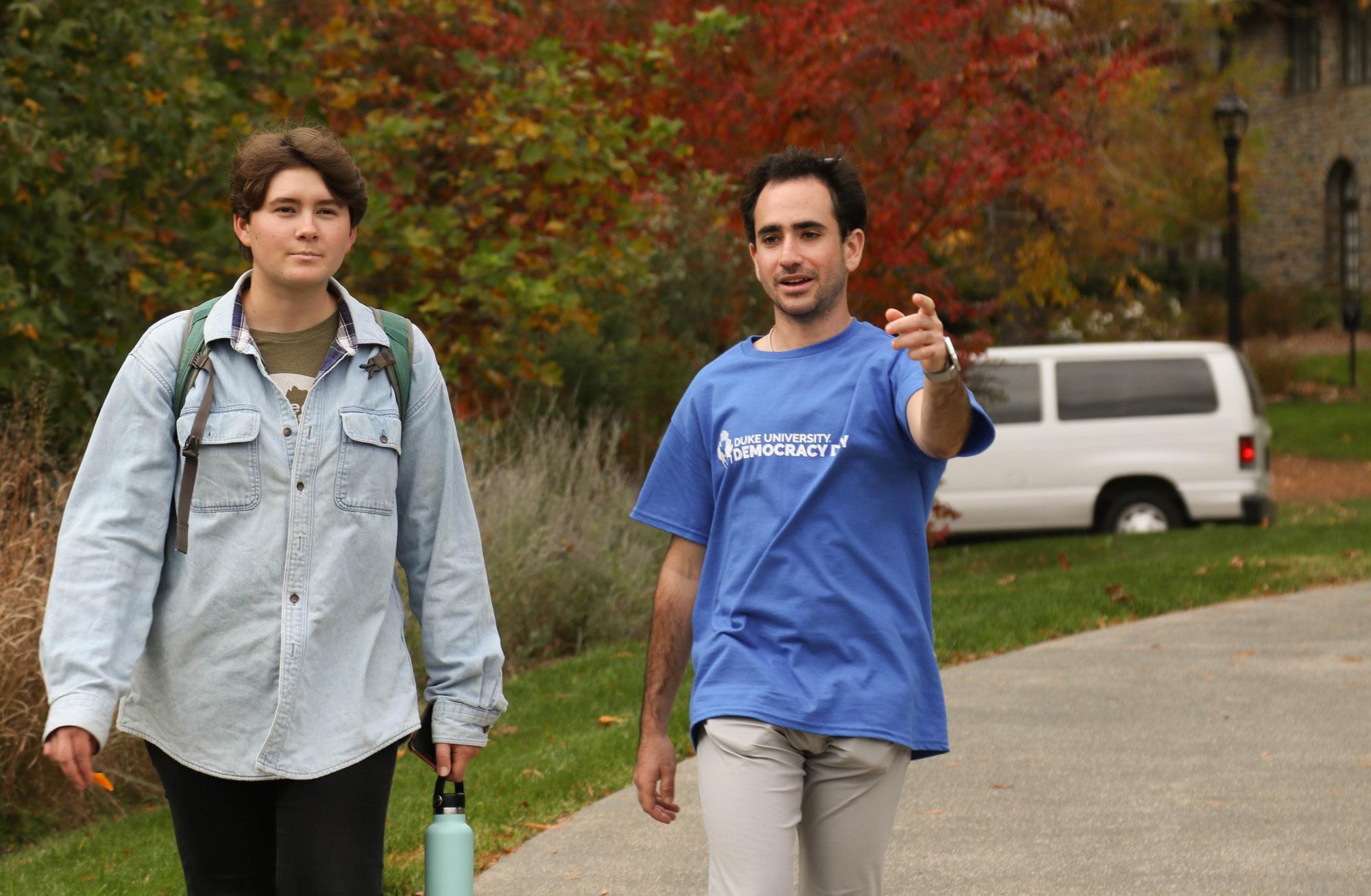
“We have got a lot going on today,” he said. “We want to find new ways to keep people engaged.”
Tobin, a Duke Student Government senator for campus life, is one of the organizers behind Democracy Day. As the co-founder and operations director for the nonprofit North Carolina Young People’s Alliance, he works to civically engage students across seven universities in North Carolina.
“Right now we’re seeing record-high political disillusionment. A lot of people just feel paralyzed and have given up on the political process,” Tobin said. “Democracy Day is about empowering those people, giving them an opportunity to go out to vote, giving them an opportunity to engage with the community.”
He hopes that the day-long event will address “present bias,” which can lead busy college students to put off voting or engaging with politics.
But for Tobin, voting is just the start. He and his coorganizers hope to keep the momentum moving, beyond the polls and into active stewardship of American democracy. Public figures like Steele model that “commitment to the integrity of our democracy,” Tobin said.
“We need people to stand up for democracy. And I think it’s really important for young people as well as for the future of the country to hear that message, and to interact with that,” he said.
The bottom line: “Go vote,” Tobin encouraged. “Have faith, don’t give up, keep pushing.”
The political signs lining the entrance to the Karsh Alumni Center competed for the attention of the voters trickling into the parking lot.
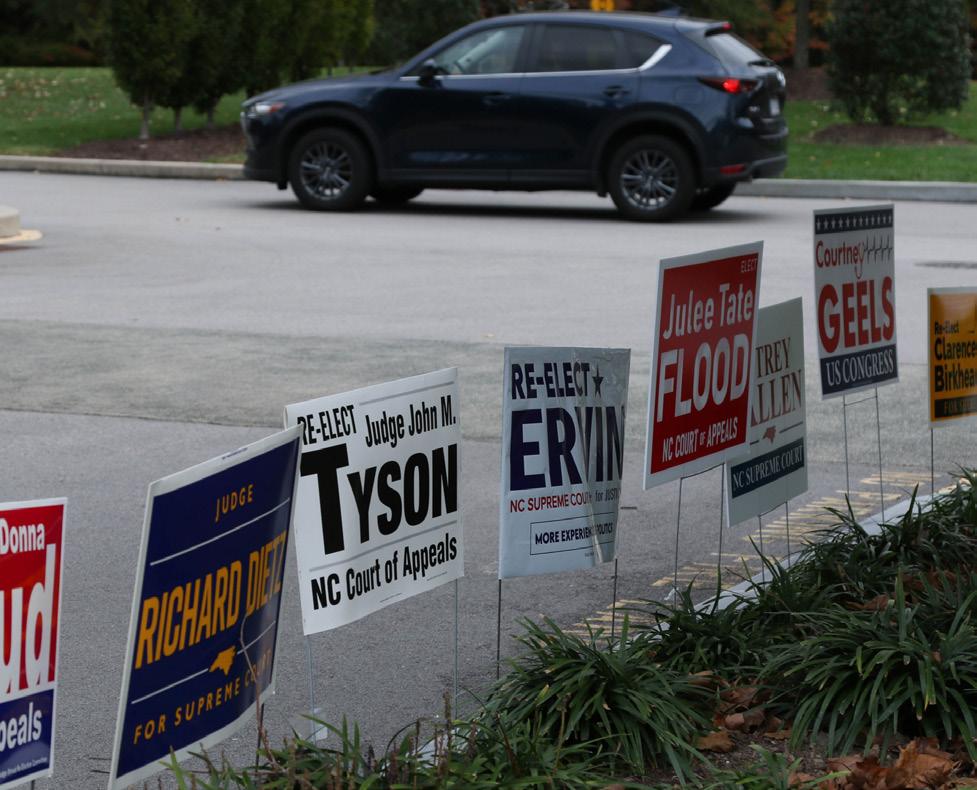
As juniors Jess On and Pilar Kelly and senior Mary Kim approached the Alumni Center, “VOTE HERE” signs pointed them to the polls. On explained that she had spent the day asking people about their voting plans before heading over from West Campus with Kelly and Kim.
The trio and other voters were greeted by volunteers making a last-minute pitch for their candidates. The voting area was marked by a huge screen which read, “Thank you for voting,” against an American flag backdrop. After a fiveminute line, they were able to register to vote, update their registration and cast their ballots.
“The poll workers were very, very helpful, and very sweet,” On said after voting. “It was really great to see especially older folks still mobilized in the effort to vote.”
In the parking lot across from Karsh, voters were able to grab free tacos, ice cream, T-shirts and stickers as local artists played live music. The scene felt closer to a tailgate than a voting site, as photographers snapped pictures of students sitting on the stoop or enjoying the music.
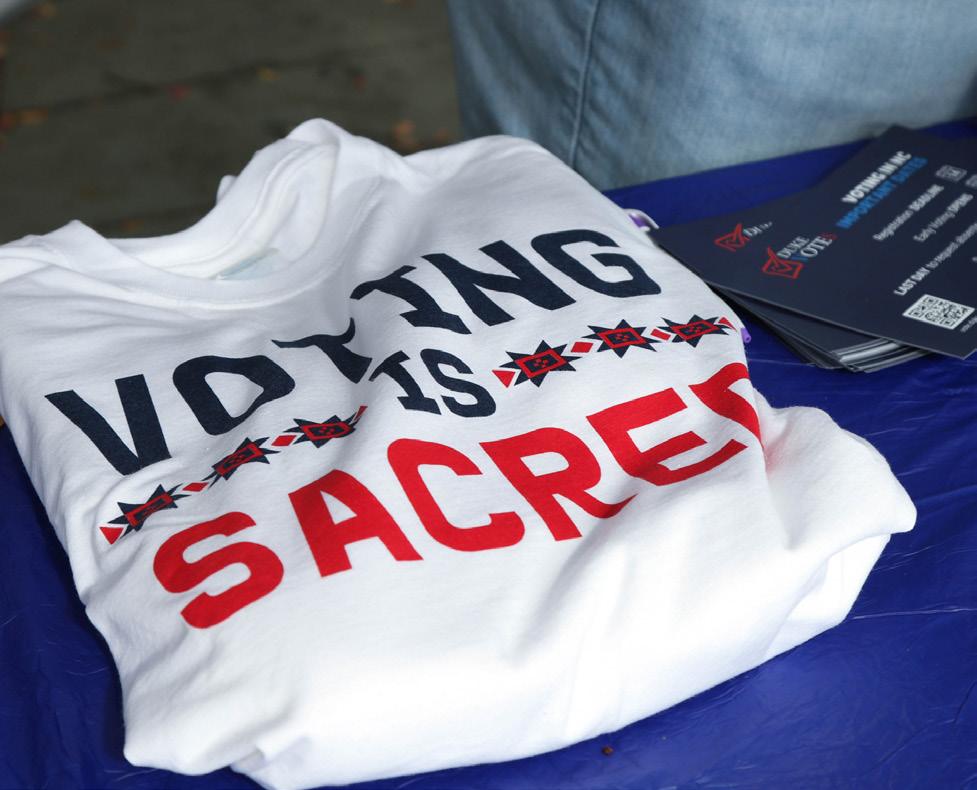
“I thought it was really cool because it kind of made voting into more of an experience,” On said. “It was a cool way of getting people motivated to vote, because sometimes people need an incentive.”
Bryan Center Plaza, 4:30 p.m.
In some ways, the table, complete with a box of Insomnia Cookies, felt like one you would find on any afternoon on the Bryan Center plaza. But Democracy Day was different — instead of club leaders drawing in students to chat, the table was staffed by city and state elected officials.
“It’s wonderful to be here talking to students, talking about
issues, making sure everyone’s registered and voting,” said NC House Representative Marcia Morey for District 30 after answering a student’s question about the location of the polls. Morey represents the Duke campus area in the state house.
Nearby, NC State Senators Mike Woodard, Trinity ’81, who represents District 22, and Natalie Murdock, who represents District 20, sat at a table with councilwoman Johnson to share what brought them to campus for Democracy Day.
Woodard, an alumnus and former employee of the University, hoped to “encourage Duke students and the whole Duke community, [and] make sure they get out and vote, especially during early voting.”
Johnson added that young people are underrepresented among Durham voters and have been the target of voter suppression.
“[Young people] are not participating in the same numbers as we see older folks, and that has a real impact on democracy and all the issues that are important to our elected officials,” she said. “People who want to suppress the vote have tried to prevent students from voting, because their voices and votes are so important.”
Voter suppression has historically been an issue in North Carolina, and state courts have recently thrown out gerrymandered maps made by the state legislature. All four NC elected officials underscored that awareness and outreach can overcome these barriers.
When asked what message they would want a Duke student to walk away with today, Sen. Murdock immediately responded: stay active.
“Do not wait for the election,” she said. “Whatever issue it is that you care about, we’re here. We are a very engaged group of elected officials. Our doors are always open.”
“I’d remind the Duke community that early voting continues to next Saturday,” Sen. Woodard said. “There’s really no excuse for students, faculty and staff [not] to go down to Karsh and cast their vote between classes, on a lunch break, or after work.”
Rep. Morey would remind students that democracy is precious. “Too many people take voting for granted, and we can’t,” she said.
Duke Democracy Day sought to engage youth voters with live music, speaker events and marches to the polls.ABIGAIL BROMBERGER
Democrat Robin Hudson, who has served on the North Carolina Supreme Court since 2007, is not seeking reelection, opening up seat 3 on the court. Seat 5 is also up for election this November.
Democrat Lucy Inman and Republican Richard Dietz will face off for the spot.
This election has the potential to alter the court’s political lean, as two of the remaining five judges are Democrat, while three are Republican.
Inman was raised in Raleigh, where she graduated from Sanderson High School. She earned her B.A. in English from North Carolina State University and pursued a career in journalism, reporting on the law and regional court proceedings.
Inman later earned her juris doctorate from the University of North Carolina at Chapel Hill’s School of Law in 1990. She became a law clerk for NC Supreme Court Justice Jim Exum and worked for nearly two decades in civil ligation in Los Angeles and Raleigh, representing a variety of individuals, businesses and corporations in cases of fraud and sexual abuse.
In 2010, she was appointed by Governor Beverly Perdue to act as a special superior court judge, which involved moderating jury trials and hearings across North Carolina.
Most recently, in 2014, she won her statewide bid to the Court of Appeals, where she still serves. She has authored over 500 decisions.
Dietz grew up in Pennsylvania. He earned his B.A. in business from Shippensburg
University in 1999. He graduated from Wake Forest University School of Law in 2002 and later received a Master’s degree from Duke University School of Law.
Post-law school, Dietz clerked for both Judge Samuel G. Wilson on the U.S. District Court for the Western District of Virginia from 2002-03 and Judge H. Emory Widener, Jr. on the U.S. Court of Appeals for the Fourth Circuit from 2003-04.
Dietz worked in private practice in 2006 as an associate at Covington & Burling, a large firm in D.C. He transitioned back to Winston-Salem, North Carolina, becoming a partner at Kilpatrick Townsend & Stockton, a large international firm.
Dietz argued at the U.S. Supreme Court in Abramski v. United States, 134 S.Ct. 2259 (2014), which ruled against gun ‘straw-purchases’, transactions where a buyer purchases a firearm on behalf of someone else.
He currently presides on the North Carolina Court of Appeals with Inman and was appointed by former governor Pat McCrory to fill a vacancy in 2014.
Inman has already once attempted to join the state’s Supreme Court. In 2019, she announced her candidacy but was narrowly defeated by Republican challenger, Phil Berger Jr. She lost by roughly 70,000 votes in the 2020 elections. So far, her fundraising in 2022 vastly outperforms her opponent’s. As of June 30, she had raised nearly $1.3 million to Dietz’s nearly $400,000.
This election is closely watched, as Supreme Court seats last for 8-year term limits and can have substantive and long-term impact on jurisprudence in North Carolina.
With midterm elections around the corner, two seats in North Carolina’s State Supreme Court are up for election: seats three and five.
Vying for seat five are Democratic incumbent Justice Sam Ervin IV and new Republican candidate Trey Allen. Allen won the Republican primary last May with 382,497 votes.
Incumbent Justice Sam Ervin IV has served on the North Carolina Supreme Court since 2015. Previously, he served on the North Carolina Court of Appeals from 2009-2015 and on the North Carolina Utilities Commission from 1999-2009.
Ervin grew up in Morganton, N.C., where he still resides. Ervin attended Harvard Law and graduated cum laude in 1981.
In the court, Ervin values informed and nonpartisan listening, which entails hearing every litigant out fairly, taking deliberation seriously and limiting decisions to the facts and the constitutions, he told The Chronicle.
“It’s called thinking that reflects an understanding of what each party is arguing for. My experience is that people understand when they go in the court system, they are not guaranteeing that the outcomes are going to be the one[s] that they want to have. But they really like that they’re being guaranteed an opportunity to be heard,” he said.
In his free time, Ervin is involved in his
local Presybterian Church, participates in charitable funds and coaches local soccer teams. His campaign for reelection advertises engagement with these activities as well as endorsements from reproductive rights advocates, North Carolina Program of AllInclusive Care for the Elderly, and the Durham People’s Alliance.
Also a North Carolina native, candidate Trey Allen received his bachelor’s degree from University of North Carolina Pembroke and law degree from University of North Carolina Chapel Hill. He served as a judge advocate in the U.S Marine Corps, where he “advised commanding generals and subordinate commanders on military justice and operational law matters, prosecuted violations of the Uniform Code of Military Justice, and helped fellow Marines resolve personal legal issues,” according to his campaign website.
In an interview with the North Carolina Channel, as well as on his campaign website, Allen has listed several values he believes a judge should prioritize: staying true to the Constitution, humility, staying nonpartisan and ensuring equal justice for all North Carolinians.
Some of Candidate Allen’s endorsers include the North Carolina Troopers Association, the Onslow Conservative Coalition and the NC Values Coalition.
Allen did not respond to a request to schedule an interview with The Chronicle.
John Della Volpe, director of polling at the Harvard Kennedy School Institute of Politics, spent his first visit to Duke doing what he does best: talking to young people.
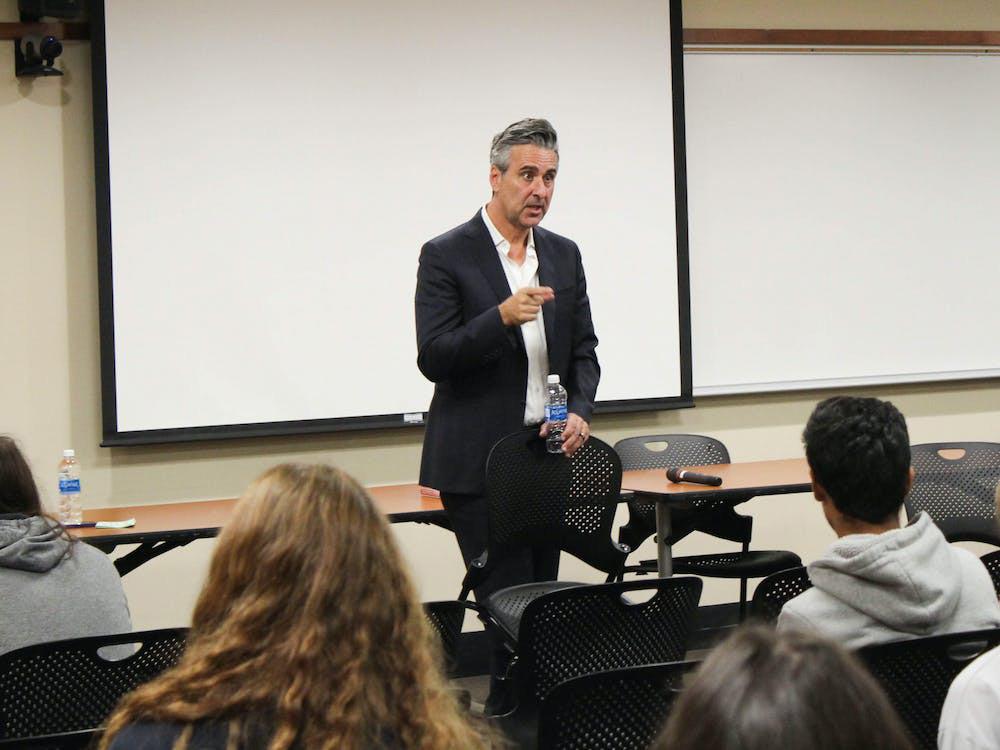
In his Oct. 4 lecture, Della Volpe, who most recently served as pollster and strategic communications advisor to President Joe Biden’s 2020 campaign, spoke about what he believes distinguishes Generation Z politically. The pollster came to Duke as part of a series of university visits following the Jan. 2022 release of his book, “Fight: How Gen Z is Channeling Their Fear and Passion to Save America.”
Della Volpe began his visit with a lunch with students. Among those present was Thalia Halloran, Trinity ‘22, associate in research of the Hart Leadership Program. The program, a service-based organization aligned with the Sanford School of Public Policy, was a sponsor and promoter of Della Volpe’s lecture.
“Since the majority of our student base is currently Gen Z, this was the kind of thing that we thought was very relevant to our students’ interests,” said Halloran.
In response to the question, “Why Duke? Why now?” Della Volpe said, “I think we are clearly on the verge of a very important election, number one. Number two, I think that a lot of what people think about Gen Z is generally wrong.”
Della Volpe spoke to the dramatic shift in voting behavior between millennials and Gen Z, noting that while speaking to Gen Z-ers in 2017, they expressed different concerns and more pronounced voting efforts than their older counterparts. In the 2018 and 2020 elections, Della Volpe noted the impact of the youth vote, emphasizing that measures concerning climate change, gun violence and student loan debt would not have been passed without young people.
“What I’m really excited about is that politicians are really beginning to get to understand that you guys actually have real power,” he said.
When the event kicked off, Della Volpe framed Gen Z as “the most diverse generation of Americans we’ve ever seen”, but also spoke to their experience of “[being] robbed of that experience of seeing America truly united.”
Della Volpe acknowledged the weights that have fallen on the shoulders of Gen Z: school safety, the opioid crisis, environmental concerns, the pandemic lockdown and
CONTINUED FROM PAGE 3 22 as the candidate for the Libertarian Party. Ubinger previously wrote to the Chronicle that he was not seeking votes and was just “buying permission to vote for [himself].”
Guy Meilleur is the Libertarian candidate for N.C. House District 30, which includes Duke’s campus. Meilleur is a “board-certified master arborist” and was previously an instructor at Duke.
Many Blue Devils are running for positions throughout the North Carolina court system. Richard Deitz, Law School ’20, earned his Masters of Law from Duke Law, and is the Republican candidate for seat three of the state Supreme Court. He
increased suicide rates, among others. Despite that, he characterized Gen Z as resilient and determined to make a change.
“[Gen Z] is almost like a diamond or something. It’s getting honed by all the darkness and the struggle,” Della Volpe said.
In the second half of the event, he outlined five events which he believes have defined Gen Z thus far: the Occupy Wall Street movement, Donald Trump’s presidency, the Marjory Stoneman Douglas High School shooting, Greta Thunberg’s protests and the murder of George Floyd. Della Volpe intentionally left out the COVID-19 pandemic, as he believes its further-reaching impacts have yet to be seen on the generation.
The audience, made up mostly of Gen Z-ers, seemed to resonate with Della Volpe’s five events and engaged more deeply in a Q&A following the talk. Their questions touched on the strategies Della Volpe used to reach conclusions, the influence social media has played in Gen Z-ers’ lives and past elections.
First-year Tyné Kidd agreed with explanations of how the generation’s defining events have influenced current political and social trends.
“It’s great being a Gen Z person, hearing that and hearing actual encouragement and credit rather than hearing that we’re just too sensitive because we’ve gone through a lot,” Kidd said.
Jenny Wood Crowley, assistant vice provost for undergraduate education, was in attendance with students from the American Experiences focus cluster. Her students attended the talk in place of their scheduled weekly dinner.
“We wanted [the Focus students] to be here to think about those issues critically in terms of the past and the current stuff that they’re reading in our class,” Wood Crowley said.
is currently a judge on the North Carolina Court of Appeals.
Democrat Darren Jackson, Law School ‘96, is seeking re-election to the Court of Appeals. Republican John Tyson, Fuqua ’88, is also seeking re-election to the Court of Appeals.
Julee Tate Flood is a first-time Republican candidate for the Court of Appeals. She was previously a faculty member in Duke’s Paralegal Program and currently works as an attorney on the court.
At the county level, Aminah Thompson, Trinity ‘03, is running for judge of the Durham County Clerk of Superior Court. She is currently a judge of the Durham County Administrative Court.
Satana Deberry, Law School ‘94 and Fuqua ‘06, is seeking re-election as Durham county’s district attorney.
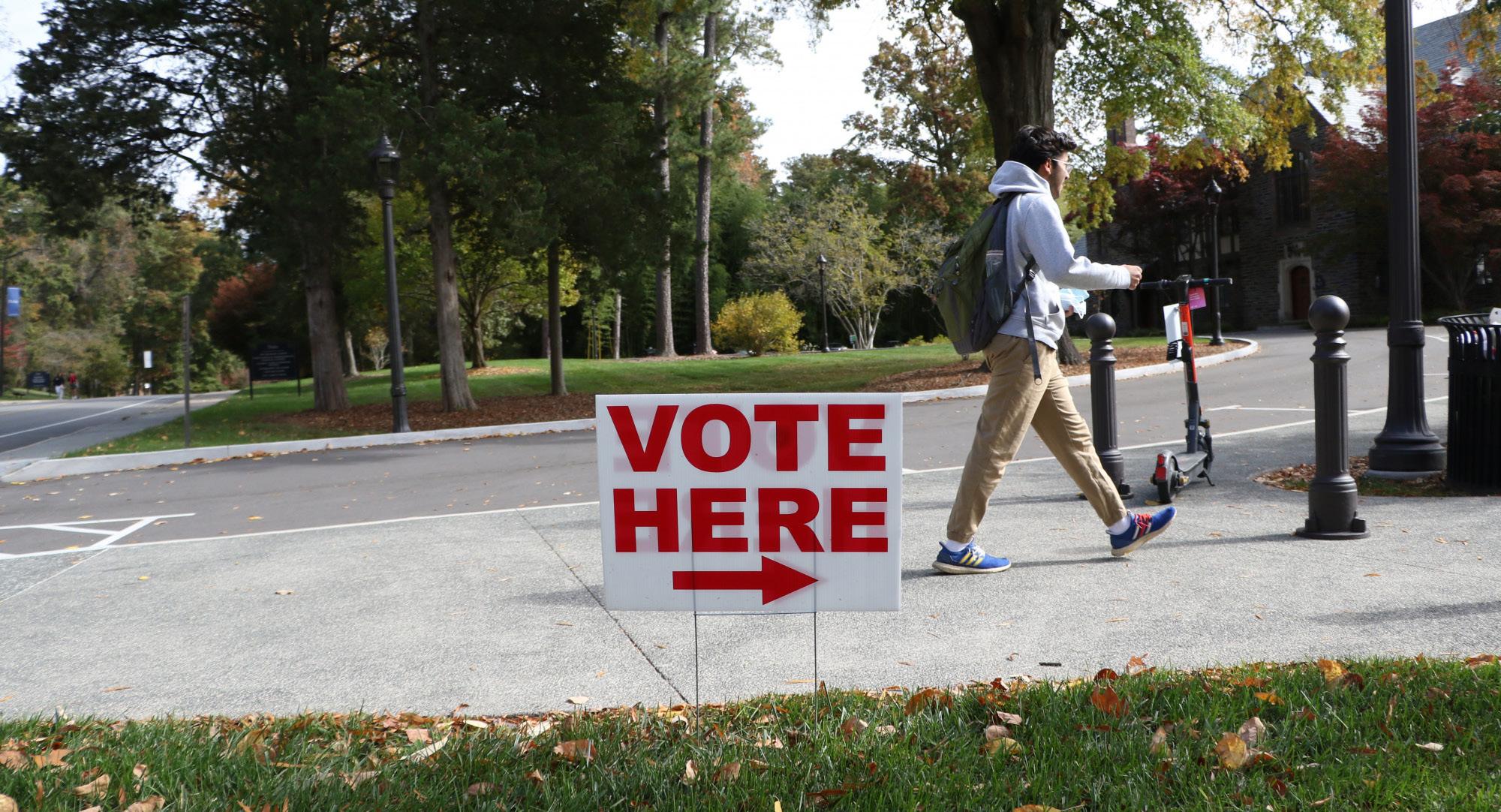
It is critical that we understand what the next few months could mean for our undocumented peers and that we prepare to vote for those who will protect them as the future of DACA grows grimmer.
Student voices Oct. 31
By Pilar KellyA recent campaign ad shows North Carolina Senate candidate Ted Budd walking along the border wall separating the U.S. and Mexico with a handgun jutting from his waistband. The narrator growls, “Open borders. Crime. Drugs.”
Although topics like abortion and inflation have dominated election discourse, recent threats to immigrant rights, including the DACA program, present another issue that we can’t afford to sweep under the rug.
For the past decade, the debate over the Deferred Action for Childhood Arrivals (DACA) program has meant a constant state of uncertainty for over 600,000 people brought to the U.S. as children. The program grants a renewable two-year period of protection from deportation and access to jobs, but Congress has failed to pass any legislation for permanent lawful status or paths to citizenship for DACA recipients. Since Donald Trump banned new DACA applications to the program in 2017, 100,000 young immigrants raised in the US graduate from high school each year without the same protections.
Now, the future of DACA looks even grimmer. Earlier this month, the U.S. Court of Appeals for the Fifth Circuit ruled that DACA is illegal, which immigration advocates say means certain death for the program unless Congress steps up and stamps it into federal law. With midterm elections in less than two weeks, it is critical that we understand what the next few months could mean for our undocumented peers and that we prepare to vote for the candidates who will protect them. Many of these young immigrants do not remember coming to the U.S, yet they
face countless obstacles in their pursuit of higher education. They cannot access the jobs and programs that strengthen a college application. Undocumented and DACA students are ineligible for federal financial aid, and in many states — including North Carolina — they are barred from state financial aid.
As a private institution, Duke has covered 100% of need-based aid for undocumented students and DACA recipients since 2017. However, only DACA recipients can receive Duke work study, according to the Duke Student Affairs Office. This means that undocumented Duke students can’t work as research assistants, teaching assistants, or any other on-campus employee. Not saving DACA means the growing population of undocumented college students around the country will continue to be systemically denied opportunities afforded to the rest of us.
Immigration is one of the biggest topics on the ballot this year, leaving DACA’s fate looming before us. If Republicans gain control of the House, it is unlikely that the program will survive. Likewise, legislation has died in the evenly-divided Senate five times. The hope that a deal on immigration could be reached hinges on the results of the midterms: “If Democrats get the majority [in both the House and Senate],” Sen. John Cornyn (R-Texas) says, “Maybe we’d be more motivated to try to do something.”
North Carolina’s two candidates for Senate have significantly different platforms in regard to DACA—and polls show that the race is deadlocked. Candidate Cheri Beasley promises to fight to protect DACA and provide a path to citizenship for undocumented immigrants in the US. However, her opponent Ted Budd would only consider allowing DACA recipients to stay if the border wall is
built, his House of Representatives website reads. On his campaign website, he alleges that undocumented immigrants are responsible for the opioid epidemic and human trafficking—a racist message disproven by an Academy of Sciences USA study which concluded that undocumented immigrants in Texas are 2.5 times less likely to be arrested for drug crimes and two times less likely to be arrested for violent crimes than native-born Americans.
The outcome of this race could decide which party controls the Senate. And with polls favoring Budd by only a few percentage points–within the margin of error– the population of a single Duke dorm could literally sway the election. In 2020, Cheri Beasley lost the race for NC Chief Justice by 401 votes; around the number of students that live in Crowell.
We don’t know who will win the Senate race We don’t know if the politicians we elect will stay
true to their campaign promises. To be frank, I have little hope in our broken system to make tangible reforms to the status quo and even less hope in the idea that the ordinary citizen has electoral power. So there’s nothing worse than hearing “just vote!” after confronting how little progress Congress has made with issues like immigration and gun violence. But voting is, at the very least, a form of harm reduction. If my vote for Cheri Beasley means one less vote for a xenophobe, that means something to me.
And if other Duke students follow my example, perhaps this election season will be the one to reignite my belief in voting power.
The futures of hundreds of thousands of our peers are hanging by a thread. Go to the Karsh Alumni Center and cast your vote now. Inform your family, friends and neighbors about the importance of DACA. And keep fighting long after the last ballot closes.
Student voices Sept. 21
MILLA SURJADI, Editor
JONATHAN LEVITAN, Sports Editor
KATIE TAN, Managing Editor
KATHRYN THOMAS, News Editor
ALISON KORN, Enterprise Editor (Spring)
ANISHA REDDY, AYRA CHARANIA, Senior Editors
PARKER HARRIS, Editor-at-Large
MADDY BERGER, Editor-at-Large (Spring)
NADIA BEY, Digital
WINNIE LU, Photography
BECCA SCHNEID, Photography Editor
MARINA CHEN, Opinion
JONATHAN PERTILE, Recess
CHRISSY BECK, General Manager
MICAH HUREWITZ, Sports
SASHA RICHIE,
ISHANI RAHA,
ADWAY WADEKAR,
AUDREY WANG,
Editor

JAZPER LU, Local and National News Editor
AMY GUAN, Health and Science News Editor
VISHAL JAMMULAPATI, Associate News Editor (Fall)
HALLE FRIEDMAN, Associate News Editor (Spring)
SEVANA WENN, Features Managing Editor
ETHAN NIANG, Senior Reporter
DAN REZNICHENKO, Opinion Managing Editor
JOCELYN CHIN, Opinion Managing Editor
SPENCER CHANG, Opinion Managing Editor
OOHA REDDY, Opinion Managing Editor
OLIVIA BOKESCH, Opinion Managing Editor
VIKTORIA WULFF-ANDERSEN, Opinion Managing Editor
EMMIE MACEDA, Opinion Managing Editor
PREETHA RAMACHANDRAN, Diversity, Equity and Inclusion Coordinator
ANNA ZOLOTOR, Recruitment Chair
MEGAN HAVEN, Advertising Director
JULIE MOORE, Creative Director
By Chloe DeckerOne of the best parts of being a Duke student is having a free subscription to the New York Times. Seriously, I am obsessed with it. If you have not yet taken advantage of this life-changing Duke student perk, I encourage you to do so immediately. Now, once you’ve signed up for the New York Times (Did I mention it’s free if you’re a Duke student?), I strongly recommend reading Opinion writer and Sanford School of Public Policy professor Frank Bruni’s appropriately titled piece “One of America’s Most Seductive States Is Also One of Its Scariest.”
Which politically seductive yet terrifying state is Bruni talking about, you ask? Indeed, if you decided against reading Bruni’s piece in its totality, here is the SparkNotes answer: It’s North Carolina, home state of Duke University, where the majority of the Chronicle’s readership attends classes and lives for most of the calendar year. As Bruni grapples with North Carolina’s fierce partisan divide in relation to the fast-approaching midterm elections, he wonders, “will Republicans capitalize on inflation and successfully caricature Democrats to a point where they win big in the midterms and also exploit that victory to shore up their power well into the future? Is a mix of rightwing warriors this bellicose and progressives this determined even governable?” In a state that simultaneously voted for a Republican president and Democratic governor in 2020, arguably anything is possible.
As one of only several North Carolina universities where the majority of the student
body does not originate from within the state, Duke holds a unique position to contribute thousands of young, diverse voters to the electorate. To exemplify the kind of impact that Duke could make, remember that only approximately 15% of the undergraduate student population calls North Carolina home. With a total undergraduate enrollment of 6,883, minus the 10% who are international students, we are left with 6,195 potential North Carolina voters, if my iPhone Calculator mathematics are correct. While local Durham County stands out as a Democratic stronghold, the same cannot be said of state politics at-large. With a win margin of just 1.34% in the 2020 General Presidential Election, the narrowest victory in all 50 states, North Carolina is an aggressively deep shade of purple.
The consequences of the upcoming midterm elections to the future of North Carolina cannot be understated. The party in power is a mere five seats away from having the ability to overrule any Governor Veto they wish. When considering the hypothetical implications of this happening, I fear the potential loss of fundamental human rights that would ensue. To name drop just a few, think reproductive autonomy, loss of voting justice through increased gerrymandering, lack of financial support for K-12 public education, and the list goes on.
Therefore, my ask for you is this: Vote in North Carolina this midterm election season.
Senate District 18, [it will] probably be a good night for Democrats. If [incumbent Sydney] Batch loses in District 17, it’s probably going to be a good night for Republicans,” McCorkle said.
Additionally, Cooper emphasized the significance of the races in House District 63, which covers Alamance County, and Senate District 7, which covers New Hanover County.
Cooper expects the most likely outcome to be that Republicans have a strong majority, but he would not be surprised if the GOP picks up the five critical seats.
In the legislative races, Republicans have an advantage because the Democratic vote is too concentrated in North Carolina’s bigger cities, according to McCorkle.
“Democrats win too many districts too easily, and are not competitive in other places,” he said.
With just a simple majority, “the Republicans are not going to propose any massive change to abortion in North Carolina, because they know that Roy Cooper will veto it and will not become law. If they get the supermajority then Roy Cooper has about as much say so over abortion law in North Carolina as the readers of The Duke Chronicle,” Cooper said.
At the national level, much is at stake in the race between Democratic candidate Cheri Beasley and Republican Congressman Ted Budd. If Beasley wins, she would be North Carolina’s first Black U.S. senator.
Cooper does not describe North Carolina as a top tier Senate race this cycle, due in part to the political party’s funding strategy.
“It’s a self fulfilling prophecy. If the parties don’t invest in the seat — specifically if the Democratic Party doesn’t invest in the seat — it’s not going to be competitive,” he said.
McCorkle reflected on the “plainness” of the North Carolina Senate race in comparison to Georgia and Pennsylvania.
“You don’t have these characters that seem almost out of a TV melodrama with you know, like, Herschel Walker or Dr. Oz,” he said. “Budd and Beasley are more plain characters.”
McCorkle suspects that the national media is tired of North Carolina as a toss-up narrative. Even though Democrats get close to winning in the Senate races, unless it’s a really good Democratic year, “they usually lose.”
North Carolina has not sent a Democrat to the Senate since Kay Hagan won in 2008.
Budd has a slight advantage in several recent polls, including those released by East Carolina University, The Trafalgar Group and Civitas.
The ECU poll showed Budd with a six point lead over Beasley, while Trafalgar placed Budd 4.2 percentage points ahead of the Democrat. Both of these results were outside each poll’s margins of error.
However, the Civitas poll showed Budd leading by 3.8 percentage points, barely within the poll’s margin of error of 3.99.
“The recent polls look better for Budd, but this is far from a landslide,” Cooper said.
Even though past trends and polls are in Budd’s favor, McCorkle is not fully convinced the race is over.
“Maybe North Carolina has changed in ways we don’t know or there’s a Kansas effect on abortion,” he said.
Seat 3 and 5 of the North Carolina Supreme Court are on the ballot this November. If a Republican wins one of these seats, the GOP would have control of the court.
According to Cooper, the GOP candidates, Richard Dietz and Trey Allen, are leading in the polls.
“In the last half decade [there has been] a real battle in North Carolina politics where the General Assembly is asserting power,” Cooper said. “And every now and again, the courts provide some check on that power.”
Over the last five years, the General Assembly has asserted power, but the courts have been able to provide checks on that power, Cooper said.
“If the Republicans take those seats, the conventional wisdom is that on issues of gerrymandering, redistricting and voter ID, that the court would make a very, very different decision,” Cooper said.
In 2022, “everything is on the ballot,” and the outcomes will have a “larger impact on your life than who the President is,” Cooper said.
McCorkle said that people should always care about voting, especially because of the growing crisis about the future of democracy.
“It’s a simple act. It may seem inconsequential to people, but it really is going to matter that people are affirming their belief that whatever problems we got now, this is still a great country with great promise,” he said.
“I don’t want to get ahead of myself… there is probably a reason that [canceling all student loan debt] hasn’t been done,” Foushee said. “For me to believe that I can come in day one and say, ‘Yes we can cancel all student debt’ … I don’t know how we’re going to do it.”
Foushee believes that the United States has a role to play in advancing democracy across the world, but is hesitant to support the use of military intervention to perform such a role. She also supports a two-state solution to the Israel-Palestine conflict, hoping to prioritize the assurance that human rights are protected.
Foushee’s campaign elicited controversy when Federal Elections Commissions records revealed that 54% of her campaign’s fundraising during the primary came from the American Israel Public Affairs Committee, a political action committee that supports pro-Israel candidates.
Foushee defeated Durham County Commissioner Nida Allam, the first Muslim woman to be elected to office in North Carolina, in the Democratic primary for the District.
Super PACs spent nearly $2.7 million to advertise on behalf of Foushee, making the primary election the most expensive Democratic congressional primary in North Carolina’s history.
“My campaign did not take funding from AIPAC. There were AIPAC members who donated to my campaign. That situation was not something I could control,” said Foushee. “[There] were supporters…that I learned who were members of AIPAC who have supported me since I was a school board candidate. Should I not have taken money from those same individuals who supported me as a school board candidate or a county commissioner or a state senator because I was not aware that they were supporters of this one issue organization?”
Foushee also threw her support behind getting money out of the political campaign system, saying that Citizens United v. FEC was “decided wrong.” She said that the AIPAC funding controversy ignored the fact that her campaign received more funding from inside North Carolina and the district than any other candidate.
“I would hope, and I do believe, that my 25 years of service to this community has value,” said Foushee. “I do believe that I was the most qualified, the most experienced, and the person in that list of candidates who has given more to this district than any other.”
CONTINUED FROM PAGE 4
Instead, Geels wants to focus on solutions that bring down the cost of a college education. She believes the reason tuition is so high is because the federal government is willing to give out giant loans.
“I think if schools knew that students didn’t have access to that high capital, would they even charge that much anymore?” Geels said.
CONTINUED FROM PAGE 5
midterm races across the nation this fall, and North Carolina is no exception.
In response to the question “What would be your ideal abortion law?” Budd said, “I’ve always been pro-life … I’ve always been about protecting the life of the mother. I want to save as many unborn lives as possible.”
In September, the three-term Congressman co-signed House Resolution 8814, which would instate a national ban on the procedure after 15 weeks. On Friday, however, he did not specify how far he believes restrictions should go in cases of rape, incest or danger to the life of the mother. And despite his support for the H.R. 8814, he said in regards to the Dobbs ruling that the issue of abortion access should be left to the states.
Budd criticized Beasley’s support of the Women’s Health Protection Act of 2022, which he called “the most extreme bill in legislative history.” The bill passed the U.S. House and failed in the Senate. It would have codified a health care provider’s ability to provide abortions and a patient’s right to have an abortion prior to fetal viability, and the right to abortions after viability if the pregnancy poses a health risk.
He also claimed that she supported abortion “at any time, for any reason, up until the moment of birth” at the expense of taxpayers. Beasley denied this, clarifying that she “believes in the standards as outlined in Roe, with protections and restrictions,” which permited lateterm abortions in cases where the life of the mother was in danger.
The former North Carolina Supreme Court Justice
also expressed a desire to codify its protections into law.
“The bottom line is, Congressman Budd wants to be in between a woman and her doctor. And there is no place in the exam room for Congressman Budd,” she said.
Both candidates shied away from being associated with leaders of their party. Beasley demurred when asked whether she’d want President Joe Biden’s support on the campaign trail. Budd, who was endorsed by former President Donald Trump in the GOP primary, said he was “going to exclusively focus on this (race) right now” when asked if he would support a 2024 run.
Boyum also asked each candidate whether they believed that the results of the 2022 election would be legitimate. Both candidates agreed.
Budd also acknowledged the legitimacy of Biden’s electoral victory in 2020. However, he stood by his prior vote not to certify the results of the election.
“The core of that vote was to inspire more debate,” Budd said. “I do stand by that vote.”
Beasley honed in on this decision, also criticizing her opponent for referring to participants in the Jan. 6 attack on the Capitol as “patriots.”
“He continues to spread the big lie of the 2020 election,” she said.
Beasley also defended her own demands for a recount in her last election, where she lost her seat on the N.C. Supreme Court.
“What I asked for was a fair, legal recount and once I saw the results I was happy to concede,” she said.
The candidates agreed that illegal immigration is a pressing issue. Beasley pushed to accompany stronger borders with policy changes to provide legal pathways for immigration.
“Let’s be clear, there are some folks who should not be in this country,” she said. “Reform means that we absolutely must secure the border … We also must have a clear pathway to citizenship for DREAMers and for those who serve honorably in the military.”
Budd responded by affirming his support for a border wall and for border control workers. He argued that movement across the southern border was responsible in large part for the fentanyl epidemic and for other instances of crime across the country. Every county in North Carolina, he said, is “like a border country” as a result.
“It’s not the whole solution,” Budd said of a border wall, “but it’s a large part.”
Beasley concluded the hour-long debate by sharing her personal story and shifting focus back to her vision for North Carolina.
“We need to have safe communities. We need to support our farmers and small businesses. We need to make sure there’s an advocate for us, fighting for our rights in the Senate. And we also need to make sure that people can live a safe, healthy and productive life,” she said.
Budd’s final message reiterated one of his talking points of the night: linking his opponent with Biden. He said that he believes Biden has set the country on the wrong track, pointing to Biden’s approval ratings, which currently hover around 42%.
“Joe Biden is on the ballot on Nov. 8, and he goes by the name this year of Cheri Beasley, because she will be a rubber stamp,” he said.
CONTINUED FROM PAGE 9
Pretty please. I know that there are big elections happening across the country this November, however, I implore you to take time to look into where your vote would matter more. Where could you make a bigger difference? Although North Carolina may not be your home state, it is home to over 10 million other people, including myself, as well as all of the future Blue Devils who will one day call Duke University and Durham home.
In an election year without a presidential decision on the ballot, the impact a Duke student’s vote could make is even larger. In 2014, the last time a US Senator was elected from North Carolina during a midterm election cycle, only 44% of eligible North Carolinians cast their ballot. Compare this to the 2020 Presidential Election year, where an unprecedented 75% of North Carolinians voted, and you can see how your vote could make an even bigger splash in a cycle with no Presidential power up for grabs.
The next time you’re in WU waiting on a mobile order during lunch rush hour, take a moment to deep dive into the partisan margin differences between your home state and North Carolina. With this in mind, determine if you should register to vote here, a state where your vote can genuinely tip the scales. I promise you it will take less time than a Mobile Order crepe from Cafe.
